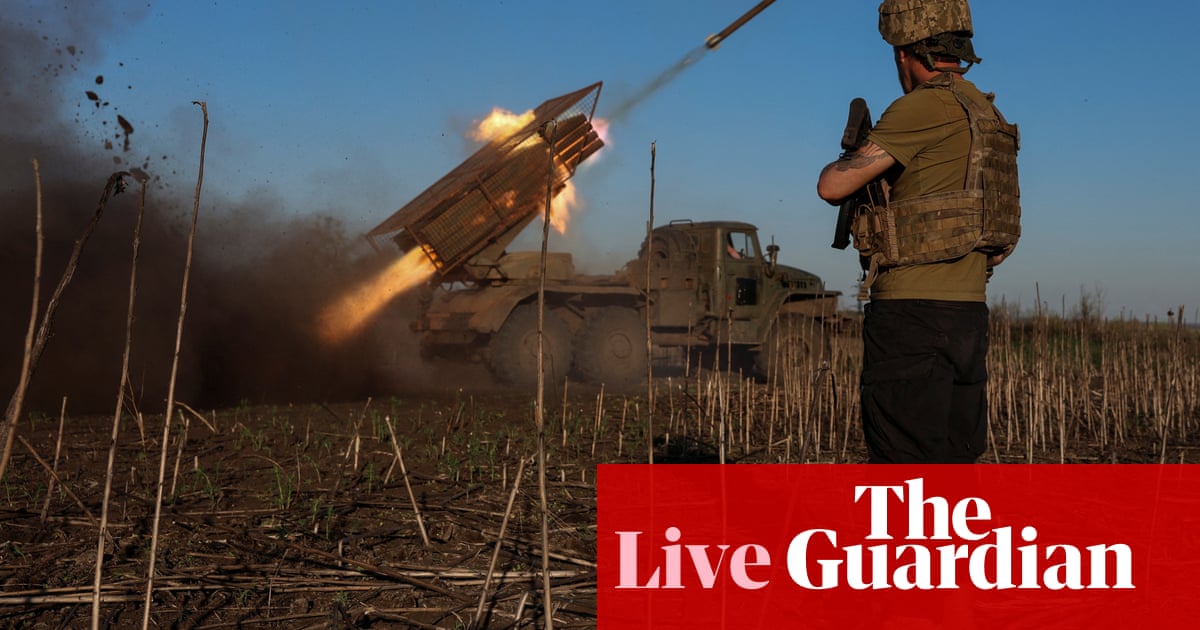Hundreds of people have fled the Jenin refugee camp and surrounding areas as an Israeli assault on the West Bank city enters its third day, amid a deepening crackdown across the occupied Palestinian territory.
“Most of the camp’s residents were forced out, and I was made to leave my neighbourhood,” said 65-year-old Saleh Ammar, who fled the Jouret al-Dhahab neighbourhood inside the camp. “I saw with my own eyes the 12 large bulldozers they brought in: if they wanted to destroy an entire city, they could have done so.”
Israeli officials have labelled the latest escalation in the West Bank, codenamed Iron Wall, which began just days after a ceasefire in Gaza came into effect, as part of a shift in the aims of the war that began in October 2023, after an attack by Palestinian militants on Israeli towns and kibbutzim around the Gaza Strip.
The Israeli military said it was operating in Jenin to target Palestinian militants in the refugee camp, with the Israel Defense Forces spokesperson, Lt Col Nadav Shoshani, telling reporters in a briefing that the operation was intended to prevent militants “from regrouping” and attacking Israeli civilians.
Ammar accused forces affiliated to the Palestinian Authority of shooting at residents of the refugee camp before Israeli forces entered, to assist their assault. The PA launched its own assault on the camp in December, intended to target militias that oppose its rule.
“I am so upset by the Palestinian Authority invasion – they burned the houses, installed snipers on the rooftops and opened fire randomly,” he said. “This continued until Israeli forces entered the camp … we are living between two fires.”

Ammar said he and his family were forced to walk out of the camp on Wednesday afternoon by Israeli forces, despite his objections.
“I had to argue to retrieve my wife’s medication, she has high blood pressure and diabetes,” he said. He and his family walked 3km to safety through the mud now covering the roads that lead out of the camp.
“The Israeli army wants to destroy the camp and make it like Jabaliya,” he said, in reference to a refugee camp in Gaza that has been the target of Israeli bombardments until the recent ceasefire. “They want to destroy the houses, bulldoze the streets and remove residents from the camp. They told us to get out before they start bombing.”
He added: “I expected that things would calm down after the ceasefire but I did not expect that the Palestinian Authority would partner with the Israelis in killing its own people.”
The Jenin governor, Kamal Abu al-Rub, told Agence France-Presse that hundreds of people who lived in the camp “have begun leaving after the Israeli army, using loudspeakers on drones and military vehicles, ordered them to evacuate the camp”.
Israeli public radio said 2,000 people had fled the refugee camp “after being inspected” by Israeli forces there, citing military sources who indicated the assault on Jenin would continue for some time.
The Palestinian news agency Wafa said Israeli forces further tightened their grip across the West Bank, erecting more checkpoints outside big cities from Jericho to Ramallah, causing long tailbacks of traffic and preventing movement across the territory.
Shoshani indicated that the assault on the Jenin camp involved battles taking place in mosques and hospitals, but blamed Palestinian militants for embedding there. “Hopefully we will be able to do counter-terrorism without the terrorists fighting us from civilian infrastructure,” he said. “But history shows that this is something that may not happen.”
Danny Yatom, a former head of the Mossad who is now a member of the policy group Commanders for Israel’s Security, told reporters: “We need to carry out pre-emptive attacks. We will not wait for a squad from Jenin to come and enter Tel Aviv, but we will do our utmost in order to gather the information needed about this squad, and we will kill them.”

Angelita Caredda, the Middle East and north Africa director for the Norwegian Refugee Council (NRC), pointed to the 12 people who had been killed and 40 injured in the Israeli assault on Jenin, in which drones, aircraft and other heavy weaponry have been used. Several medics at the public hospital close to the camp said they were injured after being targeted by snipers.
She said: “We are seeing disturbing patterns of unlawful use of force in the West Bank that is unnecessary, indiscriminate and disproportionate. This echoes the tactics Israeli forces have employed in Gaza.”
The NRC said the escalation in the West Bank had coincided with the PA’s efforts to assert control in Jenin by targeting armed groups who have long resented its control, and deference to Israeli forces. Three-quarters of Jenin’s residents had already been displaced by the PA’s assault on the refugee camp that began in December, the NRC added.
Shoshani said the IDF had not issued any evacuation order. “There is no evacuation order in Jenin. There is no plan to issue an evacuation order in Jenin. If you hear that, you should know it is fake news,” he told reporters in a briefing.
A man who lives on the edge of the camp told AFP that the Israeli army asked people to leave between 9am and 5pm local time. “There are dozens of camp residents who have begun to leave,” he said. “The army is in front of my house. They could enter at any moment.”
The Palestinian Red Crescent (PRC) said its ambulances had helped almost 650 people who had fled the refugee camp in the heart of the city and adjacent neighbourhoods over the past day, but could only rescue those who had managed to escape to other parts of Jenin that medics could access.
“We are still receiving calls from people inside the camp or surrounding areas,” said Nebal Farsakh of the PRC. “We’re getting more calls now as people need their medications, they need basic supplies like nappies as it’s the third day of this, so some families have run out of supplies or need to be evacuated. That’s why people want to get out of these areas where they can’t leave, often it’s just to get basic groceries,” she said.
Medics with the PRC were finding coordination with Israeli forces in Jenin arduous, she added, including repeated refusals or long delays. Its teams had treated five cases of physical assault and seven injuries from live ammunition since Wednesday.
Yatom said Israeli forces had launched the operation in Jenin because the PA had been unable to rid the camp of armed groups including militants aligned to Hamas.
“There is now cooperation between the Palestinian Authority security apparatus and the IDF, even though the PA security could not accomplish the mission in general,” Yatom said. “So it was a mistake … Hamas was never deterred. It was a total mistake of our security apparatus to think that Hamas is deterred.”
In Gaza, Palestinian journalists have shared videos on Instagram showing civilians trying to find their relatives among the bodies recovered by rescue services in recent days.
In an apparent violation of the ceasefire reached between Israel and Hamas and implemented on Sunday, an Israeli tank killed two Palestinians west of Gaza’s Rafah on Thursday, Reuters reported quoting the territory’s civil defence.
The alleged incident coincided with a statement from the Israeli prime minister, Benjamin Netanyahu, who said on Thursday: “Israel has a right to continue military attacks in Gaza if it deems negotiations regarding the second phase of the ceasefire agreement with Hamas to be fruitless.”

 2 months ago
41
2 months ago
41













































